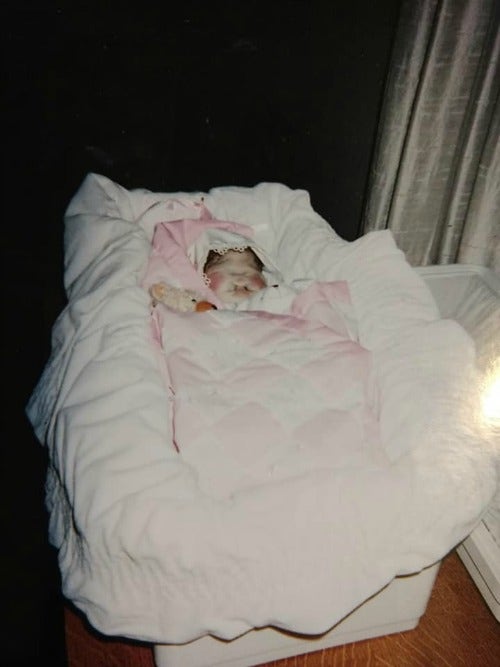The Traumatic Reality Of Who Is Really Hurt By Late-Term Abortion Laws
Baby Molly was loved and wanted, but her mother wishes she hadn't been forced to carry her to term.
 courtesy of the author
courtesy of the author Editor's note: According to TIME Magazine, New York state recently passed new legislation regarding late-term abortion.
TIME explains that previously, mothers could only receive an abortion after 24 weeks of pregnancy if her life was in danger. Under the new law, abortion is legal after 24 weeks if her health is threatened (not just her life), and if the fetus would not live naturally outside of the womb.
The new law has thrust abortion laws into the spotlight once again as political parties debate the issue.
RELATED: 18 Celebrities Who Had Abortions — And Aren't Ashamed
In light of New York's late-term abortion laws, I wanted to share my story for anyone that needs to hear it.
In 2006, at 21 weeks pregnant, I went into my OB/GYN for a routine ultrasound. My doctor told me they suspected my daughter had Trisomy 13.
Also known as Patau Syndrome, WebMD describes Trisomy 13 as a genetic disorder stemming from having three chromosomes 13 instead of the normal two. The extra chromosome leads to mental issues and physical deformities, and the lifespan of babies born with the disorder rarely live more than a year.
The doctors told me they needed to do an amnio, or prenatal test, to be sure. Then they asked if I wanted to terminate the pregnancy. I said I wanted to wait until the results came back. I wasn't able to make that decision without knowing for sure.
They told me that the results would be back in 7-10 days, and by that time I would be past 22 weeks and would not be allowed to have a medical abortion in my state.
I had forty-five minutes to make that choice. Forty-five minutes!
I decided to wait for the results. That decision is the biggest regret of my life and I have played that conversation in my head over and over for the past 13 years.

The results came back positive. Molly had a genetic chromosome disorder.
Over the following weeks, I learned she had two holes in her heart, her brain was not formed properly, she didn't have eyes, she had a cleft palate, extra fingers and toes, and barely-functioning lungs.
The only thing keeping her alive was me.
They told me I probably wouldn't carry full term and if I did, her survival was unlikely. The truth was, Molly would suffer immensely if she lived past birth.
I carried Molly full term to 40 weeks and gave birth with a team of doctors by my side. I held her in my arms for 31 minutes and watched my daughter suffocate to death.
Every single day after I found out the results was torturous. Delivery was torture. Telling my children that after I had the baby, she would die was torture. Telling my family was torture. People would congratulate me on my pregnancy and I would smile and say, "Thank you," because retelling my story over and over was torture.
And that's why I'm against abortion regulation. Medical decisions should be between the patient and the doctor — period.
That was my choice and it was taken from me. The PTSD I still go through daily is real and debilitating some days.
Molly was wanted. Molly was loved.
My heart goes out to anyone denied late-term abortions. These are not people who just changed their minds, these are heartbreaking, gut-wrenching, life-changing stories and nobody gets to make those decisions for someone else.
If you want to learn more about third-trimester abortions or the courageous people who risk their lives providing compassion to women, I recommend watching the documentary After Tiller.
Thank you New York, Alaska, Colorado, New Hampshire, New Mexico, Oregon and Vermont for your compassionate laws regarding third-trimester abortions. Thank you for trusting women and their doctors to make these excruciatingly hard choices. Thank you for your compassion.
Crystina Irizarry lives in Bellingham, Washington. She lived in South Dakota when she was pregnant with baby Molly.

